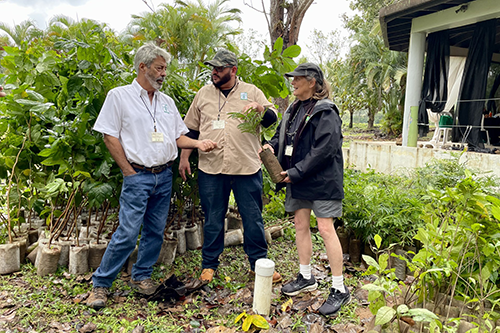
NCBA CLUSA’s Board of Directors met in San Juan, Puerto Rico last month for our quarterly board meeting. We chose Puerto Rico to give board members a first-hand look at how one of our newest development projects is impacting coffee growers on the island. We felt lucky to have our newest board member, Rosemary Mahoney, along with us. A Cooperative Development Consultant with the International Finance Corporation, Mahoney was unanimously elected[1] during our October board meeting. She is a past director of NCBA CLUSA who brings deep experience in international cooperative development to the board.
Before recapping the week’s activities, I want to thank Liga de Cooperativas de Puerto Rico (La Liga) for graciously hosting our board at La Liga headquarters in San Juan, Puerto Rico. Established in 1948, La Liga is the territory’s co-op apex organization and a longstanding member of NCBA CLUSA. Franco Jiménez Sanabria, Infrastructure and Operations Manager for La Liga, unpacked how the association advances an inclusive, sustainable and resilient cooperative movement in Puerto Rico through advocacy, education and training.
We were also warmly welcomed by José Julián Ramírez, Executive Director at the Cooperative Development and Investment Fund (FIDECOOP in Spanish), a key local partner that provides vital loans, access to capital and business accelerator services to co-ops. During our visit, FIDECOOP joined NCBA CLUSA as a new member. On Monday evening, Cooperativa de Seguros Múltiples de Puerto Rico hosted us for a dinner reception, where we met with Inclusiv and other key financial and mutual insurance partners in Puerto Rico.
Puerto Rico itself has a legacy of cooperation, rooted in the mutual aid practices of pre-colonial indigenous Taíno communities.[2] Today, one in three Puerto Ricans—more than 1.3 million people—belongs to a co-op, with a particularly strong financial cooperative sector that collectively holds $10.2 billion in community-owned assets and represents the third-largest financial entity on the island. After Hurricane Maria, these co-ops were “financial first responders,” back on their feet within 48 hours while banks remained closed.[3]
Supporting coffee growers in partnership with USDA

On Monday, we stayed in San Juan to meet with local co-op stakeholders and partners from the U.S. Department of Agriculture in Puerto Rico. NCBA CLUSA’s new Puerto Rico Climate-Smart Coffee project (known locally as Café del Futuro) is among the first awarded under USDA’s historic Partnerships for Climate-Smart Commodities investments.
Backed by a $15 million grant from USDA, Café del Futuro unites a coalition of cooperatives, support organizations for small and underserved farmers, academic bodies and sustainability experts to establish a benchmark for climate-resilient agriculture globally. The pilot project will incentivize 2,000 coffee growers to adopt climate-smart practices by subsidizing coffee, shade and hardwood trees; providing cash grants and last-mile technical assistance; and access to specialty coffee markets with the intention of increasing incomes and promising durable economic and food security benefits.
In addition to learning about USDA’s investments in Climate-Smart Agriculture, USDA Puerto Rico state officials from Rural Development, Rural Partners Network, Cooperative Business Services, and Natural Resources Conservations Services (NRCS) discussed their priorities in Puerto Rico and how the U.S. and Puerto Rico cooperative movements can play a role. Ultimately, USDA’s investments in Puerto Rico are designed to help the island build resilience in the face of hurricanes, earthquakes, pandemic recovery and climate change. “We’re not just trying to make ends meet; we’re trying to bring prosperity to rural Puerto Rico,” said Maximillian Trujillo, USDA Rural Development’s State Director for Puerto Rico.
“We’re not just trying to make ends meet; we’re trying to bring prosperity to rural Puerto Rico.” – Maximillian Trujillo, USDA RD State Director for Puerto Rico.
In the afternoon, board members heard from representatives at Cooperativa Agro-Comercial, Puerto Rico’s oldest agricultural cooperative with 100+ coffee-producing members and a roastery that processes popular brands including the artisan coffee brand Café Cibales. We also stopped at nearby ElectricCoop, a cooperative working to provide sustainable, reliable and affordable energy solutions in the territory.
Building resilience in the face of climate change

Echo Domingues, Acting National Program Officer for USDA’s Partnerships for Climate Smart Commodities, joined NCBA CLUSA on Tuesday for a field visit in Adjuntas, a small mountainside town in the central midwestern portion of the island. Our first stop was Productores de Café de Puerto Rico (PROCAFE), a nonprofit association of 600+ coffee producers and local partner of Café del Futuro.
PROCAFE welcomed our delegation with enough pour over coffee to compete with the downpour outside. Between cloudbursts, we toured what Executive Director CJ Acosta called PROCAFE’s “simplest, yet most impressive innovation”—a gutted school bus outfitted to transport 6,500 coffee seedlings. This creative solution tackles a huge challenge in Puerto Rico: getting inputs in the hands of rural coffee growers. Over the last five years, PROCAFE has distributed more than 3.5 million coffee trees. The partnership with Café del Futuro will bring at least 2.6 million more coffee trees to that count.
The project will also distribute 135,000 shade and hardwood trees to support agroforestry goals, said Marcus Laws, Café del Futuro Project Director. While on site, NCBA CLUSA board members joined in the first deliveries of 6,500 coffee and 1,000 shade trees to nearby coffee farms. During an afternoon visit to PROCAFE member Erik Torres’ mountaintop coffee farm, it was clear how vulnerable coffee trees are to the elements. Climate-smart practices like planting shade and hardwood trees alongside coffee trees shield them from the sun and provides a critical wind barrier.
Coffee growers here bore the brunt of Hurricane Maria, which destroyed 85 percent of the island’s coffee harvesting and damaged more than 20 million coffee and shade trees. Even during a good year, a coffee producer will lose 5-10 percent of their trees every year to wind, lightning and drought. Planting the drought- and coffee leaf rust-resistant varieties of coffee trees being distributed by Café del Futuro offers another layer of climate resilience. So does diversifying their crops. In one project led by PROCAFE, coffee growers also planted plantains and taro root, which can be harvested in between coffee harvests, creating consistent income for farming communities.
“If we keep coffee alive, we keep the mountains alive.” – Remy Rodriguez Chadrón, PROCAFE Board Member
PROCAFE Board Member Remy Rodriguez Chadrón said when Puerto Rico’s coffee growers succeed, the impacts are sweeping. “Coffee is the economic engine of Puerto Rico’s mountainous regions. Coffee feeds a lot of families. If we keep coffee alive, we keep the mountains alive.”
Staying grounded in our vision for a more inclusive economy

On Wednesday, we headed back to La Liga headquarters for our board meeting. We heard reports from the board’s committees, including the newly-established Equity and Inclusion Working Group. Co-chaired by LaDonna Sanders Redmond, a Diversity, Equity and Inclusion consultant with Columinate; and Brian Cavey, Senior Vice President of Government Affairs at CoBank, this committee was discussed at our October board meeting, established in December and is designed to hold NCBA CLUSA accountable for keeping diversity, equity and inclusion at the center of its internal and external work.
The Nominating Committee also shared updates on NCBA CLUSA’s 2024 Board of Directors election. There are five open seats on the board this year, and NCBA CLUSA members in good standing are invited to cast their votes between March 11 and April 19. [Sidenote: if you haven’t already renewed your NCBA CLUSA membership for 2024, renew it now so you can make your voice heard!]
We spent a significant portion of this quarter’s board meeting discussing NCBA CLUSA’s vision to build a more inclusive economy. With Puerto Rico’s deep inequalities and history of colonialism and exploitation, it was an appropriate setting to reconsider what the association means by an “inclusive economy” and whether that vision still resonates.

When NCBA CLUSA’s Board of Directors adopted its inclusive economy vision in 2017, it was a strategic move to weave cooperative tactics on a framework that already had traction and visibility because of the Rockefeller Foundation’s Inclusive Economies Indicators Report. Seven years later, the board wanted to consider how the association can stay grounded in this vision and refine our co-op story in a way that connects with critical audiences like researchers, funders, academics, journalists and influencers.
During her Ignite Talk over lunch, Sanders-Redmond challenged board members to anchor the phrase “inclusive economy” in meaningful action.
“Our work is to address the socio-economic, political and—as we have seen in Puerto Rico—environmental challenges in partnership with those who are othered. And the remedy’s not just in revising the narrative; it’s in adapting our strategies and tactics to remove the barriers that stand in the way of a truly inclusive economy,” Sanders-Redmond said.
With the United Nation’s 2025 Year of the Cooperative on the horizon, board members agreed now is a good time to sharpen both the association’s message and its impact.
We also recognized Juan Fernández, president and CEO of Louisiana Credit Union League; Debbie Wege, Cooperative Community Advocate at BECU; and Carla Decker, president and CEO of SkyPoint Federal Credit Union for their member recruitment efforts.
[1] NCBA CLUSA by-laws allow the association’s board to elect directors to diversify the board’s expertise, demographics or geographic representation. These directors serve a three-year term.
[2] #coops4dev, “National Report: Puerto Rico,” International Cooperative Alliance/Cooperatives of the Americas
[3] Budet, Tony, “Cooperatives proudly serve their members,” Credit Union National Association, August 2022


